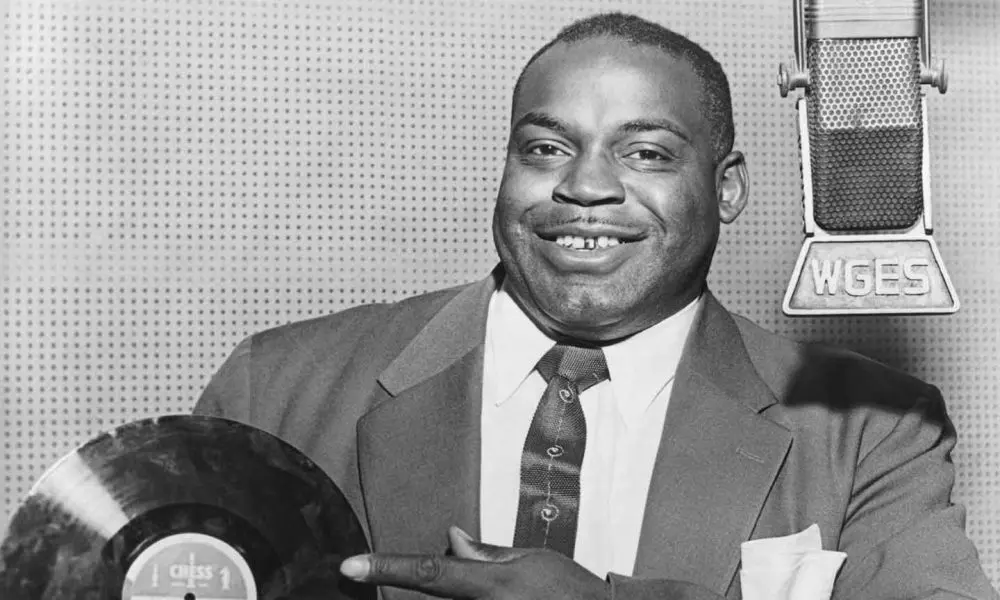Willie Dixon – The Greatest Blues Songwriter
This fixer, arranger, talent scout, boxer, performer, and songwriter did more to shape the sound of post-war Chicago blues than any other.

Born in Vicksburg, deep in the heart of the Mississippi Delta, on July 1, 1915, Willie Dixon was a fixer, arranger, talent scout, boxer, performer, and songwriter who did more to shape the repertoire and sound of post-war Chicago blues than any other person. Having acquired an acute sense of verse and rhythm from his mother, who wrote and recited poetry, Dixon sang at the Springfield Baptist Church at the age of four and got to know the blues when he served time at a prison farm as a young teenager. Later in his teens, he sang bass in a gospel quintet, the Union Jubilee Singers, that regularly performed on the Vicksburg radio station WQBC.
When Dixon was 21 he hoboed to Chicago, took up boxing – he was a big man – and by 1940 he was playing bass for the Five Breezes and recording for Bluebird. Having resisted the draft, on the grounds that America was a racist country, he was imprisoned for 10 months. By 1948 he was in a band called The Big Three that recorded for Bullet Records before switching to Columbia. It was also in 1948 he began working part-time for Leonard and Phil Chess, the founders of the fledgling Aristocrat (soon to become Chess) Records, whom he met while jamming with Muddy Waters at the club the brothers owned, the Macomba Lounge.
1954 was his breakthrough year, when Muddy Waters recorded his compositions “Hoochie Coochie Man,” “I’m Ready,” and “I Just Want to Make Love To You,” and Howlin’ Wolf recorded his “Evil.” At the same time, Dixon played bass with the Chess house band, recording with virtually every name artist in Chicago, and crossing over to rock‘n’roll to play on several of Chuck Berry’s hits.
He became a jack of all trades for Chess: A&R man, arranger, songwriter, and bass player, penning songs for Little Walter (“Mellow Down Easy,” “Too Late,” and his hit “My Babe”), Bo Diddley (“Pretty Thing”), and Willie Mabon (“The Seventh Son”), among many others.
After a falling out with Chess, Dixon decamped to the newly formed Cobra label where he had a hit with Otis Rush’s first single, “I Can’t Quit You Baby.” He returned to Chess in the early 60s, staying throughout the decade. He was pivotal in organizing the American Folk Blues Festival tours of Europe, on which he played bass in the backing band. He also formed the Chicago Blues All-Stars, a flexible touring and recording outfit that included musicians such as guitarist Johnny Shines and pianist Lafayette Leake.
In the 1960s and 1970s, Dixon’s songs were widely covered by a new generation of blues-influenced bands. The Rolling Stones had a number one UK hit with his “Little Red Rooster;” the Yardbirds covered “You Can’t Judge a Book By Its Cover;” Cream recorded “Spoonful;” Led Zeppelin covered “You Shook Me” and “I Can’t Quit You Baby;” The Doors made a signature song of “Back Door Man;” and the Allman Brothers waxed “Hoochie Coochie Man.”
“My Babe,” which was based on the traditional gospel song “This Train (Is Bound for Glory)” was recorded dozens of times, by everyone from Elvis Presley to Nancy Wilson. Eric Clapton has covered Dixon’s songs throughout his career, among them, “Evil,” “Spoonful,” and “Hoochie Coochie Man.” He joined The Rolling Stones in the studio for their cover of “I Can’t Quit You Baby” on their 2016 Blue and Lonesome album.
“The blues are the roots and the other musics are the fruits. It’s better keeping the roots alive, because it means better fruits from now on. The blues are the roots of all American music. As long as American music survives, so will the blues.” – Willie Dixon
Dixon left Chess in 1971 and spent the decade as an itinerant recording artist. In 1982, the man who had become one of the blues’ most respected ambassadors formed The Blues Heaven Foundation, an educational institution that is now housed in the old Chess building, and which put his songwriting royalties to good use. In 1988 he recorded a critically acclaimed album and in 1989 published his autobiography, I Am the Blues.
On January 29, 1992, aged 77 he died of a heart ailment in Burbank, California.
Listen to the best of Willie Dixon on Apple Music and Spotify.













Martin Harris
July 3, 2021 at 10:28 pm
The late piano legend Henry Gray, a gracious and humble man, told me he had written Little Red Rooster. I said “I thought Willie Dixon wrote it?” and Henry said “no, I did. But I was working for Willie back then.”
Mike
July 26, 2023 at 5:27 am
His contribution to the blues is incalculable. What a great artist and businessman also
Darryn Sceeles
November 2, 2023 at 11:30 pm
Martin Harris: apparently he would take songs from impoverished blues musicians for as little as a lunch or dinner.